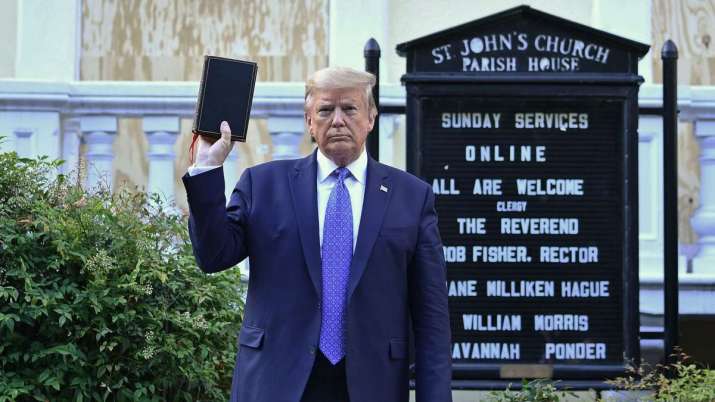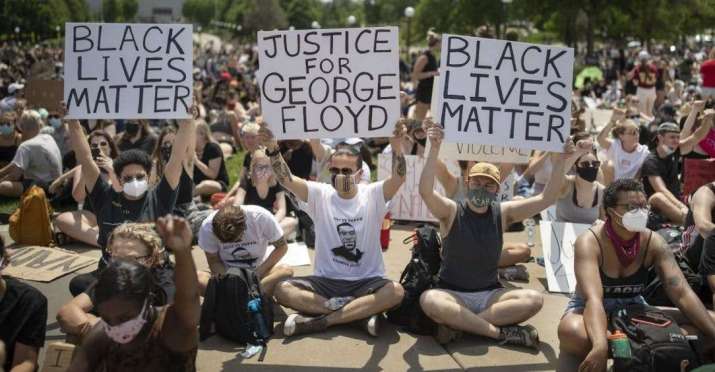FEATURES|THEMES|Commentary
Buddhistdoor View: Spirituality, Empathy, and Power – Goods to be Reconciled
 Donald Trump holds up a Bible at St. John's Church in Washington, DC. From axios.com
Donald Trump holds up a Bible at St. John's Church in Washington, DC. From axios.comIncredible scenes of protests and police violence in the US, sparked by the killing of George Floyd on 25 May, continue to spread across the world. Coming fast on the heels of a botched and patchwork response to the COVID-19 pandemic, which has resulted in the deaths of an estimated 110,000 people in American, the protests across multiple cities show no signs of abating. This is no surprise. As with the pandemic, the response of the administration of President Donald Trump to the civil unrest has been disastrous. Perhaps the most illustrative and ruinous sight was how Trump ordered police to violently disperse peaceful protestors between the White House and the nearby St. John’s Church, all so that Trump could take a photo in front of “the Presidents’ Church.”
Republican leaders had to fall in line to defend Trump’s unprecedented actions, ignoring a public statement from the Episcopal bishop managing the church. Bishop Mariann Budde went on cable TV decrying Trump’s actions: “After speaking so harshly and with militaristic overtones to the nation, he had the park of peaceful protesters cleared with tear gas and officers in riot gear to make a symbolic gesture, holding a Bible as if to spiritually condone a message and a posture that is antithetical to the teachings of Jesus and everything as a church we stand for.” (CBS News)
Bishop Budde also noted in subsequent Tweets: “The president did not come to pray; he did not lament the death of George Floyd or acknowledge the collective agony of people of color in our nation. He did not attempt to heal or bring calm to our troubled land.” And: “The Bible teaches us to love God and our neighbor; that all people are beloved children of God; that we are to do justice and love kindness. The president used our sacred text as a symbol of division.” (Twitter)
The bishop is certainly right about division. Observers of American affairs have noted that the country has been divided for a long time along certain fault lines, and the inequity of the economic divide—especially between Blacks and Whites—is an old story. Yet there is something different here. We are seeing the damage that can be done if the power establishment is corrupted and lacks the imagination to see the perspectives of others, especially those with long memories dating all the way back to slavery.
Trump’s cynical treatment of religion is symptomatic of power corrupting basic spiritual decency. A day after his church visit, Trump went to the Saint John Paul II National Shrine. In response, Washington archbishop Wilton D. Gregory said he was “baffled” by the visit, and called it “reprehensible that any Catholic facility would allow itself to be so egregiously misused and manipulated in a fashion that violates our religious principles, which call us to defend the rights of all people even those with whom we might disagree.” He further noted: “He [Pope John Paul II] certainly would not condone the use of tear gas and other deterrents to silence, scatter, or intimidate them for a photo opportunity in front of a place of worship.” (Time)
 Protesters gather at the Minnesota State Capitol in St. Paul on 2 June for a rally to remember George Floyd. From startribune.com
Protesters gather at the Minnesota State Capitol in St. Paul on 2 June for a rally to remember George Floyd. From startribune.comMuch of the discourse in the philosophy of the Black Lives Matter movement (and many others that assume the concerns of Black Americans) has centered rightly on race. So distinctive is America’s historical obsession with race that even the Dalai Lama had to point out the obvious. As he noted during his revent Avalokiteshvara empowerment: “Just yesterday I saw on the television news, somewhere in Minnesota or somewhere in America, one black person had actually fallen under a car, and the police came and he actually pushed his knee on the neck of that black person. So because of this racism, discrimination on the basis of race, such things are done.” (Buddhistdoor Global)
However, there are two other important elements driving the current civil unrest: a howl of rage against the sense of powerlessness felt by the working and middle class, and the extraordinary concentration of economic, political, and socio-cultural power among a very small and exclusive elite. This gap is effectively unbridgeable as long as the system remains corrupted by misplaced priorities. There is also a corresponding howl of despair at the lack of empathy that American leaders have for the fear felt by their own people for the future—from the environment and healthcare to the economy. The looting done by a minority among the mass protests, despite its illegality and immorality, has identifiable and articulable causes that go right to the heart of the deprivation and desperation that the un-empathetic prefer to ignore or overlook. (The Atlantic)
The problem is that power and empathy are construed by too many as being antithetical. This certainly seems to be the instinctive reflex of too many in the political establishments of so many countries, not only the US. As COVID-19 changes our world in ways that we are only beginning to understand and articulate, leaders at the governmental, economic, and civic level (including religious leaders) must examine with greater urgency how oppressed minorities, but also the so-called 99 per cent of the world, can participate in the sharing of “power.” Power comes in diverse forms, such as social mobility, freedom from certain social ills, and self-realization.
Leaders also need to avoid, or renounce, their own subtle corruption by wrong conceptions of power. This can only be done when a sense of spiritual purpose and empathy is included in the entire package of leadership. Many in the BLM movement already understand this; unfortunately, this is where leaders at the national level often fail. In Trump, we see a toxic, worst-case scenario mix of corrupted power seeking to exploit a cheapened aesthetic of “religion” (the kind of religion that worships the idol of power only, rather than life or dignity), and the seemingly final snuffing out of empathetic thinking. This is, without a doubt, the most un-Buddhist model of leadership possible.
See more
Peaceful Protesters Tear-Gassed To Clear Way For Trump Church Photo-Op (NPR)
Top Republican senators defend Trump's church photo-op after peaceful protesters cleared out (CNN)
Mariann Budde (Twitter)
Washington Archbishop Calls Trump’s Visit to Catholic Shrine ‘Baffling and Reprehensible’ (Time)
Why People Loot (The Atlantic)
Related news from Buddhistdoor Global
Dalai Lama Decries “Racism, Discrimination” Behind the Killing of George Floyd
Related features from Buddhistdoor Global
How to Be a Buddhist Protester
Be Still and Heal: Forbearance on the Path of Awakening
Related blog posts from Buddhistdoor Global
Integrating the Caravan Leader and Junzi in Buddhist Leadership














